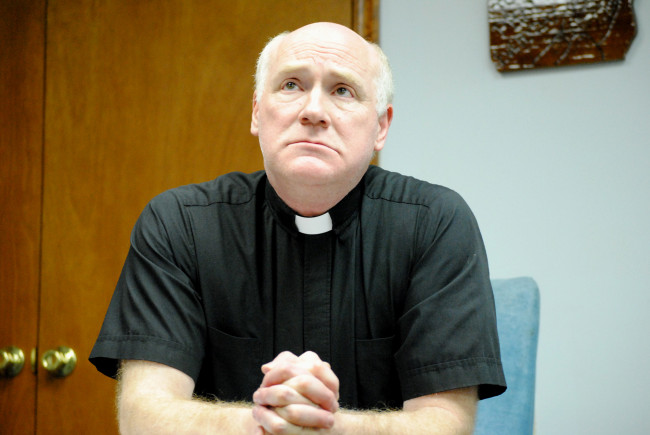ARCHIVES: Historic fight for Pennsylvania miners retold in emotional one-man play in Scranton

In the basement of the rectory of St. John Neumann Parish in Scranton on Wednesday night, the spirit of the area’s “Labor Priest,” Rev. John J. Curran, was resurrected for one night of live theater.
Award-winning actor Gary Anderson, who was in town to portray historical lawyer Clarence Darrow in “Honoring the Judiciary: Clarence Darrow’s Judicial Perspective” the following night, performed the first-ever live reading of local playwright K.K. Gordon’s latest work, which chronicles the struggles of Curran and the mining community he supported in the early 1900s.
Read under the working title of “For the Least of Them,” the one-man play is told from Curran’s perspective and delves into the man’s historical impact. As the founding pastor of Holy Saviour Church in Wilkes-Barre in 1895, he fought for the rights of local miners, many of whom were members of his own parish.
Friends with both John Mitchell, president of the United Mine Workers of America, and U.S. President Theodore Roosevelt in his time, Curran played a significant role in settling the Anthracite Coal Strike of 1902. The emotional story also gives audiences insight into the daily lives of the workers for the Pennsylvania Coal Company.
Still a work in progress, the first half of the roughly two-hour play takes place in late October of 1902 in Curran’s room in Holy Saviour Church, and the second act occurs about four months later. Rev. William Pickard allowed the basement to be used for the intimate performance, attended by about 20 people.
“He was a tribute to our area. He was right in our backyard; he was born and raised in Hawley. He was a very influential person, a very courageous person, and a very saintly man,” Pickard said.
Gordon wrote the play with Anderson in mind and said it took at least three tireless weeks of 10-hour days to research and write the show.

“Putting this together was a remarkable experience. I knew nothing about Father Curran when I met Gary. After working with him on one of his Darrow plays, we went looking for Father Curran’s grave and didn’t come close to finding it. But on the way, he said, ‘I’d really like to have somebody write a play about Father Curran,’ and I said, ‘I do more than turn the lights on!’” he recalled with a laugh.
“There are some bugs in this play, but I’m proud of it. I felt I got to know this man very well to the point where I was having nightmares about losing my mule in the mines. … My connection with reality was gone for about two months.”
Known across the country for his plays about “Scopes Monkey Trial” lawyer Darrow, Anderson was thrilled to work with the “remarkable” playwright on another history-laden piece.
“I can’t imagine a time when we did that to our children,” Anderson told the audience.
“Plays and the creative forces that go into them, such as K.K.’s great talent, can also be an instrument of social justice to remind us of how far we’ve come and how far we still have yet to go, so if that moves you to tears, then good.”
During a question and answer session after the performance, several members of the audience said how moved they were by Gordon’s words. Local playwright Art Walsh, who was sent the script in advance, said he could only read through the first five pages because “it hurt.” Among other touching scenes in the play, Curran describes the pain of giving last rites to a seven-year-old girl who died in the mines.
More humble about his writing, Gordon said that once edits and revisions are made, the play will once again be performed for the public at Marywood University during Thanksgiving weekend later this year.
“It was nice to hear the words come to life from the man who I wrote them for, but my job is to give him everything he needs to put on a great performance, and right now I think I have big chucks that are stumbling blocks,” Gordon said.
“Now I know it, but I need to fix those so he can do the best job he can do.”
Photos by Rich Howells/NEPA Scene

by Rich Howells
Rich is an award-winning journalist, longtime blogger, photographer, and podcast host. He is the founder and editor of NEPA Scene.



